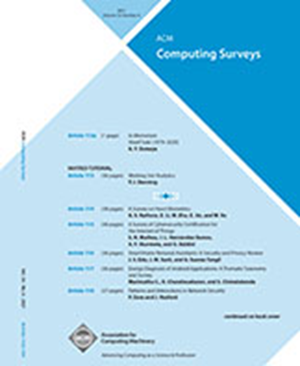Few-Shot Relation Extraction Based on Prompt Learning: A Taxonomy, Survey, Challenges and Future Directions
IF 28
1区 计算机科学
Q1 COMPUTER SCIENCE, THEORY & METHODS
引用次数: 0
Abstract
Relation extraction (RE) is critical in information extraction (IE) and knowledge graph construction. RE aims to identify the semantic relations between entities from natural language texts. Traditional RE models often rely on many manually annotated training samples, which are limited when data is scarce. Therefore, exploring how to perform relation extraction under few-shot conditions has become a research focus. Recently, prompt learning has attracted attention from researchers due to its ability to fully activate the potential of Pre-trained Language Models (PLMs), especially making significant progress in Few-Shot Relation Extraction (FSRE). This paper comprehensively reviews FSRE based on prompt learning. We first introduce the fundamental concepts of FSRE and prompt learning. Then, we systematically review recent research advances in FSRE with prompt learning, focusing on two perspectives: template construction and model fine-tuning strategies. Next, we summarize the benchmark datasets, evaluation metrics, and experimental results of representative works in FSRE. Afterward, we present practical applications of prompt-based FSRE in specialized domains. Finally, we discuss the critical challenges and future research directions of FSRE tasks based on prompt learning.基于提示学习的少镜头关系提取:分类、综述、挑战和未来方向
关系抽取是信息抽取和知识图谱构建的关键。RE旨在从自然语言文本中识别实体之间的语义关系。传统的正则模型通常依赖于许多人工标注的训练样本,当数据稀缺时,这是有限的。因此,探索如何在少镜头条件下进行关系提取成为研究热点。近年来,提示学习因其能够充分激活预训练语言模型(PLMs)的潜力而受到研究人员的关注,特别是在Few-Shot Relation Extraction (FSRE)方面取得了重大进展。本文对基于提示学习的FSRE进行了全面综述。我们首先介绍FSRE和快速学习的基本概念。在此基础上,系统回顾了基于快速学习的FSRE的最新研究进展,重点从模板构建和模型微调策略两个方面进行了综述。接下来,我们总结了FSRE中代表性作品的基准数据集、评价指标和实验结果。然后,我们介绍了基于提示的FSRE在特定领域的实际应用。最后,我们讨论了基于提示学习的FSRE任务面临的关键挑战和未来的研究方向。
本文章由计算机程序翻译,如有差异,请以英文原文为准。
求助全文
约1分钟内获得全文
求助全文
来源期刊

ACM Computing Surveys
工程技术-计算机:理论方法
CiteScore
33.20
自引率
0.60%
发文量
372
审稿时长
12 months
期刊介绍:
ACM Computing Surveys is an academic journal that focuses on publishing surveys and tutorials on various areas of computing research and practice. The journal aims to provide comprehensive and easily understandable articles that guide readers through the literature and help them understand topics outside their specialties. In terms of impact, CSUR has a high reputation with a 2022 Impact Factor of 16.6. It is ranked 3rd out of 111 journals in the field of Computer Science Theory & Methods.
ACM Computing Surveys is indexed and abstracted in various services, including AI2 Semantic Scholar, Baidu, Clarivate/ISI: JCR, CNKI, DeepDyve, DTU, EBSCO: EDS/HOST, and IET Inspec, among others.
 求助内容:
求助内容: 应助结果提醒方式:
应助结果提醒方式:


